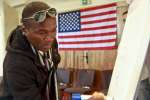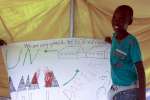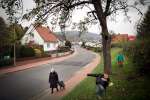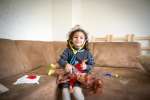Palestinian families coping well with resettlement in Iceland
Telling the Human Story, 29 June 2009
AKRANES, Iceland, June 29 (UNHCR) – Last September, UNHCR reported about the resettlement to Iceland of a group of vulnerable Palestinian women and their children from a harsh desert camp near Iraq's border with Syria.
The fortunes of Iceland have nosedived since the arrival of the group of 29, with its economy battered by the global financial crisis. But the Palestinian women are still happy to be in the rugged little island nation in the North Atlantic, as UNHCR Senior External Relations Officer Hanne Mathisen found out during a recent visit to the small fishing port of Akranes.
They were attending language classes four days a week and were able to converse with their new friends in one of only about 20 countries to accept refugees for resettlement. The Palestinians hope the economic crisis will not keep them out of work for too long. But they are thankful to be safe and that their children have access to a decent education and a brighter future.
One of the women that Hanne met in Akranes was 42-year-old Sawsan, who spent "a year of desperation" in the Al Waleed camp after fleeing Baghdad in 2007 with her son Yehya, who is now aged five years.
Baghdad
This is her tale: "I woke up one morning and my husband was gone. We looked for him everywhere, for seven months, fearing he was dead or had been kidnapped. It turns out he had abandoned us and fled to safety in a neighbouring country.
"The militia started to pay me unfriendly visits, threatening me to leave our house and saying that if I didn't they would kidnap my son. They stole all our furniture. I went to the police for help, but when they came to see me at the house, they beat me. What had I done wrong? I had lived here all my life, enjoyed respect and peace.
"We lacked everything – food, water, electricity, money. One day my son and I came very close to being hit by a road bomb. There was blood everywhere. I looked down at myself – was I still in one piece, was I still alive? I was close to having a nervous breakdown. I decided to leave."
Al Waleed
"We slept with our clothes and gloves on under layers of blankets in the freezing cold tent. I didn't dare to light a fire; many tents had burnt down. Our toilet was a simple bucket. We could only have a bath once a month. My son – then four – was chronically ill. I was afraid his head was damaged from all the violence he had witnessed. He was angry all the time.
"For a year I prayed to God to save my son. I told myself: ´I am a man, we will survive.' Then a lady from UNHCR came to interview me. For many hours, he listened. And then I got the news about Iceland. I had heard about Iceland at school and seen programmes on TV, but I had not really paid attention."
Akranes
"Iceland is my second country, after Palestine. I was met at the airport by two of my Icelandic support families from the Red Cross project, while the other two support families waited at my new home, with sandwiches – at one o'clock in the morning!
"Now, after language class my support families take me out to the movies, teach me to use the computer. We shop – I love the flea markets – or we cook falafel. No one looks at me with a bad eye. The other day a woman even came up to me at the supermarket and gave me a hug. My son loves to go to kindergarten. He has totally changed. He is happy, he listens to me – he has even started to smile.
"The Icelandic government, the Akranes municipality and the Red Cross have given us everything we need. House, furniture, salary, food and clothes. What Iceland did for us is truly humanitarian. I have found care and peace at last. And now the sun is even shining. I keep asking myself: Am I dreaming?"















































